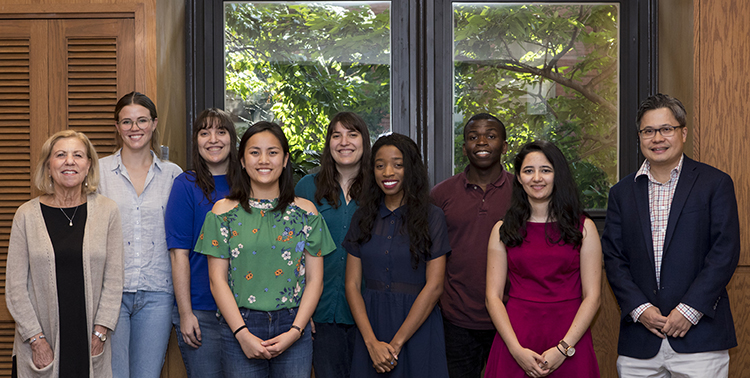Erika Gross: Chief Operating Officer for Wellness Services
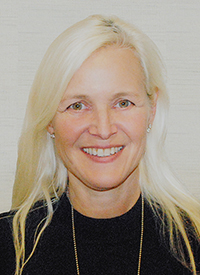 Erika Gross, director for finance, administration & risk management in Penn’s Student Health Service, has been named the inaugural Chief Operating Officer for Wellness Services in the Division of the Vice Provost for University Life. In this new role, Ms. Gross will oversee operations and the eventual co-location of Alcohol and Other Drug Program Initiatives, Campus Health, Counseling and Psychological Service, Penn Violence Prevention, and the Student Health Service.
Erika Gross, director for finance, administration & risk management in Penn’s Student Health Service, has been named the inaugural Chief Operating Officer for Wellness Services in the Division of the Vice Provost for University Life. In this new role, Ms. Gross will oversee operations and the eventual co-location of Alcohol and Other Drug Program Initiatives, Campus Health, Counseling and Psychological Service, Penn Violence Prevention, and the Student Health Service.
She will report to Chief Wellness Officer Dr. Benoit Dubé and, together, they will help VPUL carry out the vision of President Amy Gutmann and Provost Wendell Pritchett for Penn to provide a seamless and holistic wellness services for all undergraduate, graduate and professional students.
“I am honored and excited to take on this critical new position,” Ms. Gross said. “I look forward to working closely with VPUL wellness departments, and our partners across campus and the health system, to craft a world-class experience for the Penn community.”
“Erika brings a profound knowledge base and thriving campus network to this role, which will serve her and our students well,” Dr. Dubé added. “I am grateful to have her as a partner in this significant reimagining of our wellness services and delivery models.”
Ms. Gross has a 25-year professional history at Penn. Since 2011, she has served as the director of finance, administration and risk management at SHS. From 1993-2011, she held positions of increasing responsibility in the Office of Risk Management, culminating as director of international risk management.
She earned a bachelor’s degree in economics from Penn in 1990 and a MBA/MS in health/health-care administration/management from Temple University’s Fox School of Business and Management in 2006.
She will begin the COO position immediately and continue to serve Student Health Service until a search for a replacement is underway.
Marc Lo: Executive Director of Office of Penn First Plus Students
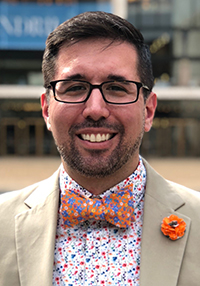 Marc Lo has been named the inaugural Executive Director of the new Office of Penn First Plus Students, effective January 1, 2019. The announcement was made by Penn Provost Wendell Pritchett.
Marc Lo has been named the inaugural Executive Director of the new Office of Penn First Plus Students, effective January 1, 2019. The announcement was made by Penn Provost Wendell Pritchett.
“Marc is a highly experienced expert in undergraduate student learning and development,” Provost Pritchett said. “He is widely recognized as a scholar and a professional leader whose research focuses on how students negotiate their multiple, intersecting identities and how those personal backgrounds and identities, from socioeconomic status to sexual identity and religious affiliations, affect their lives on campus and the choices that they make.”
Dr. Lo is currently at the Sheridan Center for Teaching and Learning at Brown University.
He has a broad range of experience across residential life, student assessment and LGBTQ student services in a career that spans more than 10 years at Brown University, the Massachusetts Institute of Technology and New York University. He was a first-generation, low-income undergraduate student at Northeastern University who went on to earn his MA in higher education administration and PhD in higher and postsecondary education from NYU.
President Amy Gutmann and Provost Pritchett established the Office of Penn First Plus Students earlier this year (Almanac May 8, 2018) to offer a hub of resources, support and community for undergraduate students from first-generation and/or low-income backgrounds (Almanac September 4, 2018).
As executive director, Dr. Lo will implement new programs, strengthen connections to faculty and alumni, and provide a strategic vision to sustain Penn First Plus initiatives. He will also work to connect the numerous existing programs and services and partner with Penn students and colleagues across the University, including Admissions, Student Financial Services and cultural centers to advance the success of outstanding Penn First Plus students.
Two Endowed History Professors
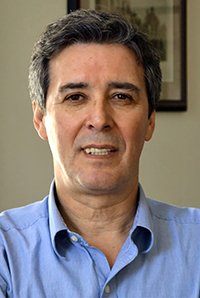 Two historians have been named endowed professors at the University of Pennsylvania.
Two historians have been named endowed professors at the University of Pennsylvania.
Antonio Feros, professor of history, has been appointed Rose Family Endowed Term Professor of History. A leading scholar of early modern European history focusing on Spain and its empire, Dr. Feros is the author of two books, Kingship and Favoritism in the Spain of Philip III, 1598-1621 (Cambridge University Press, 2000), and Speaking of Spain: The Evolution of Race and Nation in the Hispanic World (Harvard University Press, 2017), as well as three co-edited volumes and many articles. He has received a Fulbright Scholarship in Portugal and research grants from the Centro de Estudios Hispánicos e Iberoamericanos, the Luso-American Development Foundation and the Center for Latin American and Caribbean Studies at NYU.
Dr. Feros is an esteemed teacher who has been recognized with the SAS Award for Mentorship of Undergraduate Research and the department of history’s Dunn Award for Distinguished Teaching. He has served as the graduate chair of history and as a member of the Arts and Sciences Committee on Graduate Education and the University Scholars Council.
The Rose Family Endowed Term Chair was established in 1996 by Gary D. Rose (C’67) and Karen Bress Rose (CW’67, GED’68). Both Mr. and Mrs. Rose have a long history of volunteer service and philanthropy to Penn. Mr. Rose is currently an emeritus member of the Penn Arts and Sciences Board of Overseers and is a retired partner of Goldman Sachs & Company.
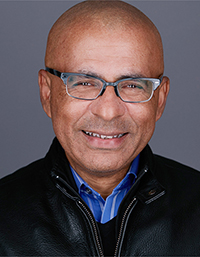 Roquinaldo Ferreira joins Penn as the Henry Charles Lea Professor of History. A historian who specializes in the history of the transatlantic slave trade, colonialism and the histories of Africa, Latin America and the wider Atlantic world, Dr. Ferreira was previously Vasco da Gama Associate Professor of Early Modern Portuguese History at Brown University, where he also served as associate director of the Center for the Study of Slavery and Justice (CSSJ). He is the author of Cross-Cultural Exchange in the Atlantic World: Angola and Brazil during the Era of the Slave Trade (Cambridge University Press, 2012) and The Costs of Freedom: Central Africa in the Age of Abolition, 1820 ca.-1880 ca., is forthcoming with Princeton University Press in 2019.
Roquinaldo Ferreira joins Penn as the Henry Charles Lea Professor of History. A historian who specializes in the history of the transatlantic slave trade, colonialism and the histories of Africa, Latin America and the wider Atlantic world, Dr. Ferreira was previously Vasco da Gama Associate Professor of Early Modern Portuguese History at Brown University, where he also served as associate director of the Center for the Study of Slavery and Justice (CSSJ). He is the author of Cross-Cultural Exchange in the Atlantic World: Angola and Brazil during the Era of the Slave Trade (Cambridge University Press, 2012) and The Costs of Freedom: Central Africa in the Age of Abolition, 1820 ca.-1880 ca., is forthcoming with Princeton University Press in 2019.
The Henry Charles Lea Professorship in History was established in 1928 through the estate of Nina Lea in memory of her father, Henry Charles Lea (1825-1909), a noted Philadelphia historian, publisher, activist and civic reformer. His career as a historian spanned over half a century, during which time he published 10 books and many articles on church history in the later Middle Ages; institutional, legal and ecclesiastical history; magic and witchcraft; and the history of the Italian city-states.
Endowing the Morris Arboretum’s Director of Facilities Position
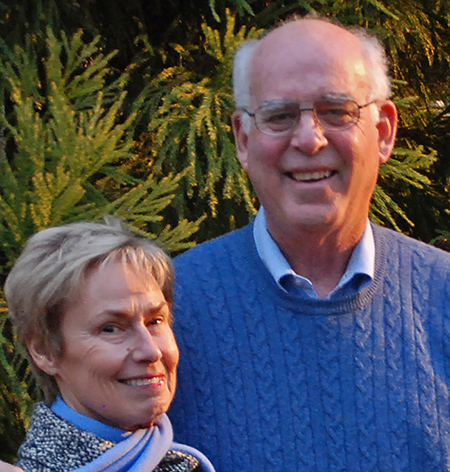
For decades, the Morris Arboretum has worked carefully to grow its endowment base in order to ensure ongoing fiscal strength and provide stable financial resources for programmatic growth. Among the greatest champions of this cause is Morris Arboretum Emeritus Advisory Board member Moses “Moe” Feldman. It is therefore the Arboretum’s great honor to announce the establishment of the Moses Feldman Family Director of Physical Facilities. This new endowment fund, made possible by Mr. Feldman and his family as part of the Ever Green campaign, will support the costs of the director’s position, thereby making it possible for the Arboretum to grow its physical facilities department, which maintains and cares for 30 buildings and many other features across the Morris Arboretum.
Thomas (Tom) Wilson, who has served as the Arboretum’s director of physical facilities since 2013 (Almanac January 15, 2013), couldn’t be happier with his new title.
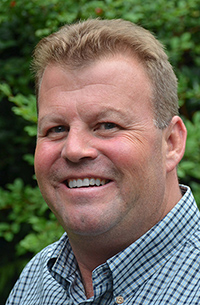 “I’ve worked alongside Moe for many years, and I am so proud to have my position be affiliated with the Feldman name. He has been a great source of support and inspiration for us all."
“I’ve worked alongside Moe for many years, and I am so proud to have my position be affiliated with the Feldman name. He has been a great source of support and inspiration for us all."
Report of the Ad Hoc Consultative Committee for the Selection of a Dean of the School of Social Policy & Practice
The Ad Hoc Consultative Committee for the Selection of a Dean of the School of Social Policy & Practice was convened by President Amy Gutmann on March 22, 2018. During its three months of work, the full Committee met on nine occasions and reported its recommendations to the President on June 20, 2018. The Committee members were:
Chair: Pam Grossman, Dean and George and Diane Weiss Professor of Education, GSE
Faculty: Jacqueline Corcoran, Professor, SP2
Ezekiel Dixon-Román, Associate Professor and Chair, Data
Analytics for Social Policy Certificate Program, SP2
Peter Frumkin, Professor, Mindy and Andrew Heyer Chair in
Social Policy, and Director, Nonprofit Leadership Program, SP2
Amy Hillier, Associate Professor of Social Policy & Practice SP2) and City and Regional Planning (Design), and Director, MS in Social Policy Program
Judith Long, Sol Katz Professor of Medicine, PSOM
Phyllis Solomon, Professor, Kenneth L. Pray Chair in Social
Policy and Practice, and Associate Dean for Research, SP2
Mark Stern, Professor (SP2) and Co-Director, Urban Studies Program
Students: Brie Starks, Master’s student
Marquisha Lawrence Scott, PhD student
Alumni: David Ertel, Trustee and Chair, SP2 Overseers
Jodi Bergstein Rabinowitz, SP2 Overseer
Ex Officio: Joann Mitchell, Senior Vice President for Institutional Affairs and Chief Diversity Officer
The search was supported by Adam P. Michaels, Deputy Chief of Staff in the President’s Office, and Robin Mamlet, Robert Luke, and Christine Pendleton of the executive search firm Witt/Kieffer.
The Committee and its consultants conducted informational interviews and consultative meetings with individuals and groups throughout the Penn and Penn SP2 communities, as well as many informal contacts, in order to better understand the scope, expectations and challenges of the Dean’s position and the opportunities facing the University in the years ahead. These consultative activities included full Committee meetings with Dean John Jackson and members of the SP2 leadership team. In addition, the Chair and the Committee members held open meetings for faculty, staff and students. The consultants interviewed administrators from the central administration and from SP2 and sought nominations from academics and practitioners across the nation and the world as well as from leaders in government, foundations, academic societies and other organizations. Finally, members of the Committee engaged in extensive networking with Penn faculty and students, as well as colleagues at other institutions. The Committee also solicited advice and nominations from all SP2 faculty, Deans, and senior administrators via email and reviewed a variety of documents about the school.
Based upon these conversations and materials, the Committee’s charge from the President and the Committee’s own discussions, a comprehensive document was prepared outlining the scope of the position and the challenges a new Dean will face, as well as the qualities sought in a new Dean. The vacancy was announced (and input invited from the entire Penn community) in Almanac.
Over the course of its three-month search process, the Committee and its consultants contacted and considered nearly 300 individuals for the position. From this group, the committee evaluated an initial pool of 45 nominees and applicants and ultimately selected nine individuals for semi-finalist interviews with the entire Committee. Based on voluntary self-identifications and other sources, we believe the initial pool of 45 contained 16 women and 29 men, and seven persons of color. The four individuals recommended for consideration to the President included two women and two people of color.
On August 29, 2018, President Gutmann and Provost Wendell Pritchett announced the selection of Dr. Sara “Sally” Bachman as Dean of the School of Social Policy & Practice. Dr. Bachman is an acclaimed scholar, teacher and academic leader passionately committed to integrating the perspectives and tools of multiple disciplines and professions in research, community partnerships, policy development and education and training activities. She will assume her new office on January 1, 2019.
—Pam Grossman, Dean and George and Diane Weiss Professor of Education, Graduate School of Education
Chair, Consultative Committee on the Selection of a Dean of the School of Social Policy & Practice
 Erika Gross, director for finance, administration & risk management in Penn’s Student Health Service, has been named the inaugural Chief Operating Officer for Wellness Services in the Division of the Vice Provost for University Life. In this new role, Ms. Gross will oversee operations and the eventual co-location of Alcohol and Other Drug Program Initiatives, Campus Health, Counseling and Psychological Service, Penn Violence Prevention, and the Student Health Service.
Erika Gross, director for finance, administration & risk management in Penn’s Student Health Service, has been named the inaugural Chief Operating Officer for Wellness Services in the Division of the Vice Provost for University Life. In this new role, Ms. Gross will oversee operations and the eventual co-location of Alcohol and Other Drug Program Initiatives, Campus Health, Counseling and Psychological Service, Penn Violence Prevention, and the Student Health Service.
 Marc Lo has been named the inaugural Executive Director of the new Office of Penn First Plus Students, effective January 1, 2019. The announcement was made by Penn Provost Wendell Pritchett.
Marc Lo has been named the inaugural Executive Director of the new Office of Penn First Plus Students, effective January 1, 2019. The announcement was made by Penn Provost Wendell Pritchett. Two historians have been named endowed professors at the University of Pennsylvania.
Two historians have been named endowed professors at the University of Pennsylvania. Roquinaldo Ferreira joins Penn as the Henry Charles Lea Professor of History. A historian who specializes in the history of the transatlantic slave trade, colonialism and the histories of Africa, Latin America and the wider Atlantic world, Dr. Ferreira was previously Vasco da Gama Associate Professor of Early Modern Portuguese History at Brown University, where he also served as associate director of the Center for the Study of Slavery and Justice (CSSJ). He is the author of Cross-Cultural Exchange in the Atlantic World: Angola and Brazil during the Era of the Slave Trade (Cambridge University Press, 2012) and The Costs of Freedom: Central Africa in the Age of Abolition, 1820 ca.-1880 ca., is forthcoming with Princeton University Press in 2019.
Roquinaldo Ferreira joins Penn as the Henry Charles Lea Professor of History. A historian who specializes in the history of the transatlantic slave trade, colonialism and the histories of Africa, Latin America and the wider Atlantic world, Dr. Ferreira was previously Vasco da Gama Associate Professor of Early Modern Portuguese History at Brown University, where he also served as associate director of the Center for the Study of Slavery and Justice (CSSJ). He is the author of Cross-Cultural Exchange in the Atlantic World: Angola and Brazil during the Era of the Slave Trade (Cambridge University Press, 2012) and The Costs of Freedom: Central Africa in the Age of Abolition, 1820 ca.-1880 ca., is forthcoming with Princeton University Press in 2019. 
 “I’ve worked alongside Moe for many years, and I am so proud to have my position be affiliated with the Feldman name. He has been a great source of support and inspiration for us all."
“I’ve worked alongside Moe for many years, and I am so proud to have my position be affiliated with the Feldman name. He has been a great source of support and inspiration for us all." Timothy Burgess (Tim) Powell, senior lecturer in the department of religious studies in the School of Arts & Sciences at Penn, died November 1 at his home in Philadelphia. He was 58.
Timothy Burgess (Tim) Powell, senior lecturer in the department of religious studies in the School of Arts & Sciences at Penn, died November 1 at his home in Philadelphia. He was 58.-resized.jpg) Bridgette Brawner, associate professor in Penn Nursing’s department of family and community health, has won the 2018 Richard L. Sowell Article of the Year Award from the Journal of the Association of Nurses in AIDS Care (JANAC).
Bridgette Brawner, associate professor in Penn Nursing’s department of family and community health, has won the 2018 Richard L. Sowell Article of the Year Award from the Journal of the Association of Nurses in AIDS Care (JANAC).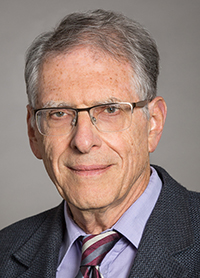 Abraham (Abe) Nitzan, Donner Professor of Physical Sciences and professor of chemistry in Penn’s School of Arts and Sciences has received the Earle K. Plyler Prize for Molecular Spectroscopy & Dynamics. This prize was established in 1976 and is now sponsored by The Journal of Chemical Physics, an AIP Publishing journal. The prize is given for experimental or theoretical achievements, for a single dramatic innovation, or for a series of research contributions which, when integrated, amounts to a major contribution to the field of molecular spectroscopy and dynamics.
Abraham (Abe) Nitzan, Donner Professor of Physical Sciences and professor of chemistry in Penn’s School of Arts and Sciences has received the Earle K. Plyler Prize for Molecular Spectroscopy & Dynamics. This prize was established in 1976 and is now sponsored by The Journal of Chemical Physics, an AIP Publishing journal. The prize is given for experimental or theoretical achievements, for a single dramatic innovation, or for a series of research contributions which, when integrated, amounts to a major contribution to the field of molecular spectroscopy and dynamics.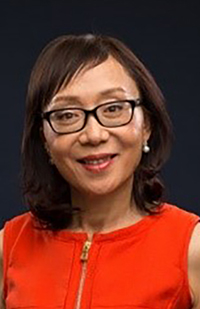 The Trustees Council of Penn Women’s (TCPW) 7th Annual Advising Award was presented to Jianghong Liu, associate professor of nursing in Penn Nursing and associate professor of public health in the Perelman School of Medicine. Dr. Liu received the award at the TCPW Fall Conference on November 8.
The Trustees Council of Penn Women’s (TCPW) 7th Annual Advising Award was presented to Jianghong Liu, associate professor of nursing in Penn Nursing and associate professor of public health in the Perelman School of Medicine. Dr. Liu received the award at the TCPW Fall Conference on November 8.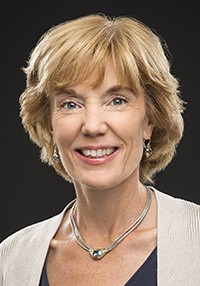 Laura Perna, the James S. Riepe Professor and chair of the higher education division in Penn’s Graduate School of Education and executive director of Penn AHEAD, has received a subcontract from the Pell Institute, funded by the Bill & Melinda Gates Foundation. The one-year, $250,000 grant, $60,000 of which is to Penn GSE, will support the production of the annual Indicators of Higher Education Equity report.
Laura Perna, the James S. Riepe Professor and chair of the higher education division in Penn’s Graduate School of Education and executive director of Penn AHEAD, has received a subcontract from the Pell Institute, funded by the Bill & Melinda Gates Foundation. The one-year, $250,000 grant, $60,000 of which is to Penn GSE, will support the production of the annual Indicators of Higher Education Equity report.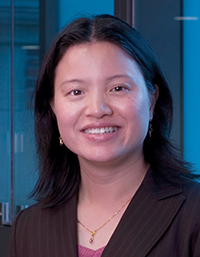 Shu Yang, professor in the departments of materials science and engineering and chemical and biomolecular engineering, in SEAS, has been elected a fellow of the American Physical Society (APS). Her fellowship nomination was from the scholarly society’s Topical Group on Soft Matter.
Shu Yang, professor in the departments of materials science and engineering and chemical and biomolecular engineering, in SEAS, has been elected a fellow of the American Physical Society (APS). Her fellowship nomination was from the scholarly society’s Topical Group on Soft Matter.